| Article ID | Journal | Published Year | Pages | File Type |
|---|---|---|---|---|
| 5572779 | Journal of Nutrition & Intermediary Metabolism | 2017 | 27 Pages |
Abstract
A number of preclinical and clinical studies have suggested that omega-3 fatty acids have a prophylactic effect against depression. The aim of this study was to explore the effect of eicosapentaenoic acid (EPA) on development of depression among Japanese patients with hyperlipidemia. This was a 3-year follow up study based on medical claims data obtained from Japan Medical Data Center. A total of 76,561 patients were eligible for the final analyses. The exposure group included EPA drug users categorized into 2 groups based on adherence to EPA using the Medication Possession Ratio (MPR) with a cutoff of 80%. The control group (non-EPA group) consisted of subjects taking lipid-lowering medications other than EPA. A Cox proportional hazard model was used to evaluate the association between EPA drug use and the development of depression. Over 3 year-follow up, 1319 (1.7%) patients developed depression. In the multivariate Cox proportional hazard model, no association was found between depression and EPA drug use in the MPR â¥80% group (HR:0.89, 95%CI: 0.67 to 1.20) or MPR < 80% group (HR:1.00, 95%CI: 0.73 to 1.37) compared with the non-EPA group. No convincing evidence was found to support the association between EPA and risk of depression before and after adjusting for age, gender, and comorbidity.
Related Topics
Life Sciences
Biochemistry, Genetics and Molecular Biology
Endocrinology
Authors
Lin Song, Satomi Yoshida, Sachiko Tanaka-Mizuno, Yusuke Ogawa, Toshiaki A. Furukawa, Koji Kawakami,
